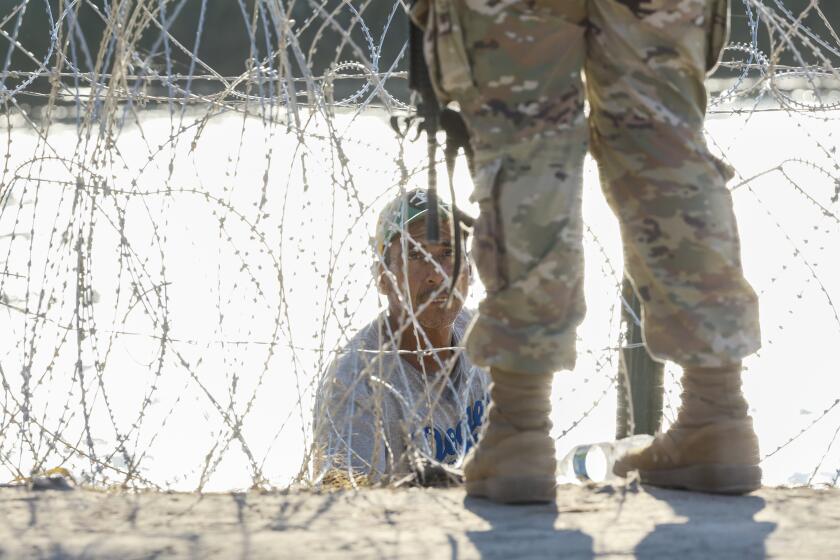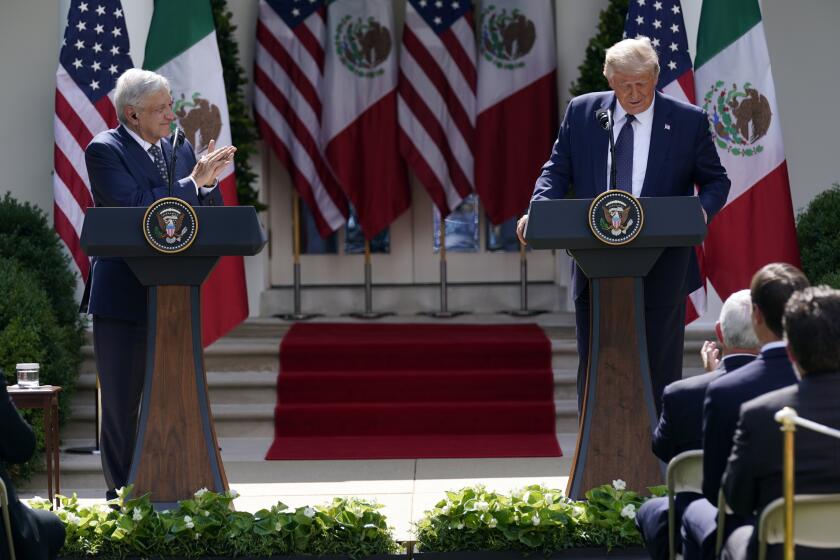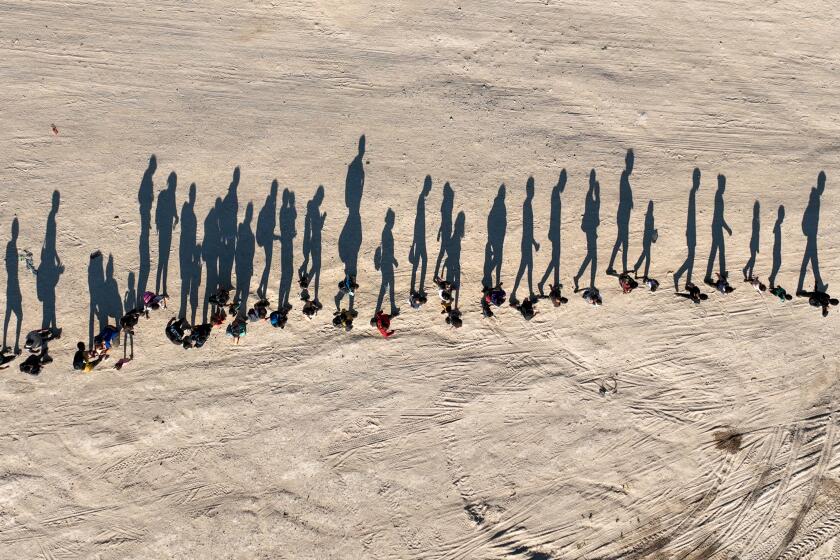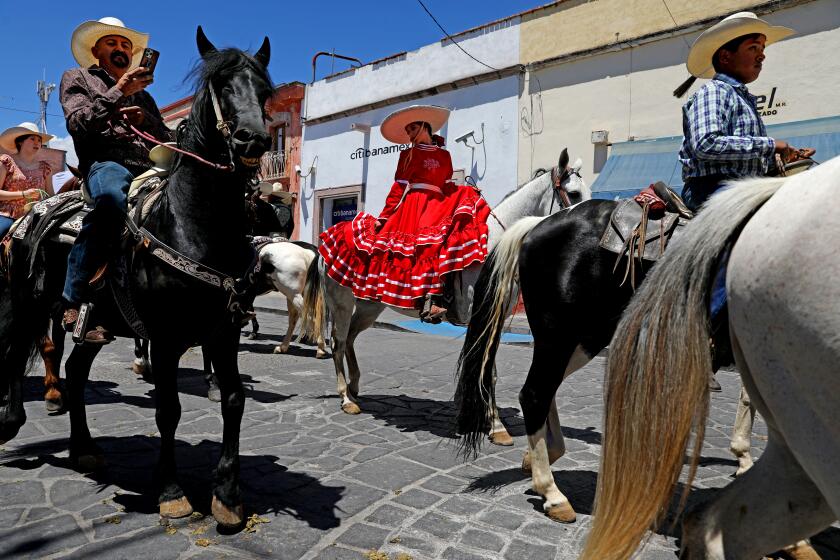‘Dehumanizing’: Mexico’s president lashes out over Texas immigration law

MEXICO CITY — Mexican President Andrés Manuel López Obrador on Wednesday condemned a Texas law that would give state authorities broad powers to arrest foreigners suspected of illegally crossing from Mexico into Texas.
After a day of back-and-forth court decisions that had left the law in effect for just hours, the Mexican president labeled the Texas statute “dehumanizing” and “anti-Christian.”
He declared that Mexico would not accommodate the return by Texas officials of any migrants to Mexican territory — a stance that calls into question how the state law would be enforced if it is cleared by the courts.
“We would not accept deportations … from the government of Texas,” López Obrador said in his regular morning news conference, backing a similar statement a day earlier from Mexico’s foreign ministry.
The Texas law would make illegal entry into Texas a state crime, directing judges to order undocumented migrants to return to Mexico.
On Tuesday the Supreme Court cleared the way for Texas to enforce the law while its constitutionality is challenged, but hours later a three-judge panel of the 5th U.S. Circuit Court of Appeals, based in New Orleans, issued an order that effectively put it on hold.
The panel heard arguments Wednesday on whether the law known as SB 4 should be allowed to take effect, if only temporarily. That panel is scheduled to hear arguments on the merits of the case on April 3.
It’s unclear when or whether the Texas law will go into effect, and it likely will make a second trip to the Supreme Court.
The Mexican president declined to elaborate on how exactly Mexico would react should the law be enforced, but said: “We won’t sit with our arms crossed.”
Texas’ controversial immigration law is on hold again after court moves that confounded the Biden administration and spurred outrage from Mexico’s government.
He didn’t predict any deterioration of relations with Washington, noting that the Biden administration is challenging the Texas law.
Mexico said international migration should remain a strictly federal matter — which is what the Justice Department is arguing in its efforts to have the Texas law declared unconstitutional.
“Mexico is not going to have a negotiation at the state level about a theme that is clearly federal,” said Eunice Rendón, a columnist with El Universal newspaper in Mexico City who follows immigration issues.
The law could cause future conflicts with Texas, she noted, but it was unclear how the controversy will play out — especially since the law’s future remains in the hands of the courts.
López Obrador labeled the GOP-backed measure the product of “anti-immigrant, anti-Mexican” sentiment and lashed out at Texas’ Republican governor, Greg Abbott, without naming him.
Justices approve a new Texas law that allows state and local police to arrest people suspected of illegally crossing the Rio Grande, and allows judges to return them to Mexico.
The president compared the situation to the idea of the Mexican state of Tamaulipas — across from Texas’ Rio Grande Valley region — targeting Texans.
“It’s as if the governor of Tamaulipas applied a law against Texans who were visiting Mexico or passing through Tamaulipas,” López Obrador said. “According to our constitution, anything that is related to foreign policy is not the responsibility of state governments.”
The president’s comments were the latest in a litany of condemnations from Mexican officials. Many pointed out that the law has the potential to harm millions of people of Mexican ancestry — be they citizens, legal residents or undocumented — who reside in Texas, where about 40% of the population is Latino, mostly of Mexican descent.
The foreign ministry said the law could “give rise to hostile environments in which the migrant community is exposed to hate speech, discrimination and racial profiling.”
For Mexican President Andrés Manuel López Obrador, appearing to stand up to the United States has proved to have political benefits at home.
Foreign Minister Alicia Bárcena excoriated it as “anti-immigrant, xenophobic, discriminatory.”
Some in Mexico viewed the state law and its widespread Republican support as an omen of how U.S.-Mexico tensions could rise should Donald Trump be elected to a second term as U.S. president.
“This is an indication of what will come in November if Trump and the Republican Party win the election,” wrote Arturo Sarukhán, former Mexican ambassador in Washington, on X, formerly Twitter.
Adam Isacson, an analyst with the Washington Office on Latin America, a research and advocacy group, noted Mexican and U.S. authorities’ common emphasis on federal jurisdiction in immigration policy.
“It underlines that the Biden and López Obrador administrations have a common adversary in Texas and in Trump-world,” Isacson wrote in an email. “For the Biden administration, it could mean a bit more leverage. They can tell their Mexican counterparts, ‘We’re the only thing standing between you and people who would carry out policies like S.B. 4, so we need you to cooperate on our priorities.”
Still, even if Trump were to be elected, Mexico has proved to be flexible with a politician who launched his previous presidential campaign by calling Mexican immigrants criminals and rapists.
López Obrador, a lifelong leftist, developed a surprisingly strong bond with Trump, who threatened during his presidency to impose ruinous tariffs on Mexican imports to the United States if Mexico did not crack down on U.S.-bound migrants traversing its territory. López Obrador’s government complied, averting the tariff hike but drawing criticism at home that Mexico was doing Washington’s “dirty work” on immigration.
Both of the major candidates vying to succeed López Obrador in Mexico’s June 2 election — Claudia Sheinbaum of the president’s Morena party and Xóchitl Gálvez Ruiz of an opposition coalition — went on X to denounce the Texas statute.
“We always raise our voice in defense of Mexicans on the other side of the border, who in large part sustain the economy of Texas,” wrote Sheinbaum.
Soldiers and razor-sharp metal at the Mexico-Texas border don’t deter migrants who traveled months to get there, as numbers of those fleeing to the U.S. soar.
Said Gálvez: “The Mexican government should act with firmness in defense of our compatriots and push for ... the annulation of this law, which attacks our brother and sister migrants.”
The Mexican government had already issued a forceful condemnation of the law on Tuesday, after a divided Supreme Court said Texas could begin enforcing the statute.
Mexico said that it would not “under any circumstances” accept the return by Texas officials of any migrants to its territory.
As crime engulfs many Mexican states, immigrants who’ve saved to retire there are reevaluating ties to home — and whether returning is worth the risk.
Under current law, the U.S. Border Patrol daily detains thousands of migrants, including Mexicans and others, and returns many to Mexico. But Mexico is only legally required to accept Mexican nationals.
Migrants detained after crossing the U.S.-Mexico border now come from a broad array of nations, including countries in Central and South America, Africa, Asia and the Middle East. In the past, Mexico has voluntarily accepted some “third country” migrants expelled from the United States. But it is under no obligation to do so.
Times special correspondent Cecilia Sánchez Vidal in Mexico City and staff writer David G. Savage in Washington contributed to this report.
More to Read
Sign up for Essential California
The most important California stories and recommendations in your inbox every morning.
You may occasionally receive promotional content from the Los Angeles Times.















